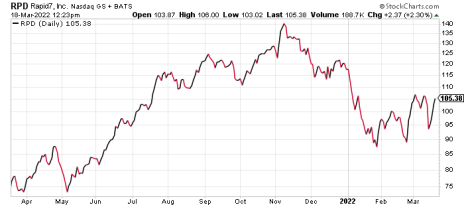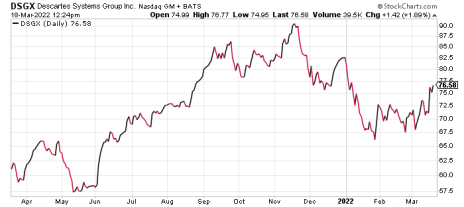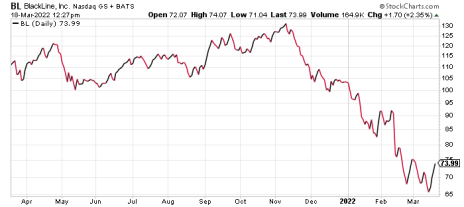Back in 2018, I wrote a report featuring 10 small-cap cloud software stocks. Since then most of these stocks are up handsomely. Two of them, RealPage (RP) and Talend (TLND), were acquired at nice premiums. Today, I’m checking back in on three that continue to look attractive for growth-oriented investors.
Two things before I get to the stocks. First, due to share price appreciation several of them are now mid-cap stocks.
Second, with the recent market volatility – due to uncertainty around the Omicron variant, inflation, European conflict and an expected rise in interest rates – the growth stock rally recently stalled out.
[text_ad]
Big picture, the secular growth trend for cloud software is intact. But software stocks are prone to corrections just like stocks in any other sector. Investors should zero in on the ones they want to hold for the long term, average in to their desired position size, then keep tabs on their holdings to make sure there are no major negative developments.
If they follow these basic rules, investors should be well-served by these three software stocks.
Small-Cap Cloud Software Stock #1: Rapid7 (RPD)
Rapid7 (RPD) is a pure-play security stock growing by well over 20% by helping businesses solve complex security and IT operations challenges. Customers use its cloud-based software to better understand, prioritize and address the threats facing their physical, virtual and cloud assets, including threats that arise from the actions of people within their own walls.
By unifying operational data from across their systems and running it through Rapid7’s analytics platform, clients gain a live, holistic view of all the activity on their network. This information can help them (1) prevent attacks by shining a light on vulnerabilities, cloud service usage, risky user behavior, and misconfigured assets, (2) allow IT, security, and operations teams to quickly detect compromises and attacks, prioritize fixes, and respond to breaches when they occur, and (3) eliminate and automate repetitive busy work and data analysis.
With a growing set of solutions to sell as part of its entry into the emerging SecOps movement, which brings together security and IT operations, Rapid7 is landing larger deals, more multi-product deals, and more customers.
In 2020 revenue was up 26% to $411.5 million and adjusted EPS was -$0.10. In 2021 revenue was up 30% to $535 million and adjusted EPS was -$0.16, but the company is anticipating full-year 2022 revenues to grow 27% to $682 million and EPS to flip positive.
This is what the chart looks like.
Small-Cap Cloud Software Stock #2: Descartes Systems (DSGX)
It’s hard to argue against a stock that’s performed as well as Descartes Systems (DSGX) over the last decade. Sure, there have been some choppy periods here and there. But most dips in the stock have attracted buyers who seem all too eager to snatch up shares of the Ontario-based logistics management software company.
That appears to be the case during this recent pullback as well. DSGX has been down as much as 26% from its recent high, but that is far less of a decline than most other software stocks.
The big-picture trend powering the stock is demand for cloud-based supply chain software solutions. As we’ve seen over the years, and especially lately, increasing complexity in global trade networks are often disrupted, slowing down delivery time.
Descartes helps customers overcome these challenges and offers faster deliveries to market by using a proprietary logistics data and analytics platform that automates and optimizes otherwise inefficient global logistics processes.
Products range from connectivity and document exchange, route planning and inventory and asset visibility, to wireless dispatch, rate management and warehouse optimization. These solutions help customers manage the flow of data and documents that track and control inventory, assets and people in motion, whether they interact with high- or low-tech partners.
The company has been around since 1981 and while it’s not always the fastest growing name out there the balance of consistent growth on both the top and bottom lines is impressive. In fiscal 2020 (fiscal year ends in January) revenue was up 18%, then growth dipped to 7% in fiscal 2021. This year revenue is seen up 20% to $420 million while adjusted EPS is seen up 67% to $1.02.
This is what the chart looks like.
Small-Cap Cloud Software Stock #3: BlackLine (BL)
Companies of significant size must complete the financial close, a recurring process that takes raw financial data and turns it into the audited financials that senior management reviews, that gets submitted to the SEC, and that becomes available for investors like us to view.
Even though it’s a cumbersome, inefficient and error-prone way to do it, many companies still do this process manually, with spreadsheets.
BlackLine (BL) has a better way. The company provides cloud-based solutions for finance and accounting departments that automate the process. This is a no-brainer upgrade even in normal times. With labor in such short supply it makes even more sense now.
The company’s platform pulls data from banks, ERPs (SAP, Oracle, Netsuite, etc.), transactional systems and more, then runs it through the appropriate BlackLine products to transform a quarterly, recurring process into a continuous one so that accountants, controllers, managers, auditors and senior managers always can have real-time visibility into the state of a company’s books.
BlackLine is going after a $21 billion global market with its enterprise class accounting automation platform and has a compelling pitch for investors.
First, the platform is largely agnostic to ERP systems (i.e. it works for most of them), meaning potential clients don’t need to restructure what they already do in order to go with BlackLine.
Second, it has a large and growing partner network that is anchored by a Solutions Extension (SolEx) partnership with SAP. In 2021 BlackLine announced new and growing partnerships with both Microsoft and Google Cloud as well as a number of smaller acquisitions. Finally, BlackLine has over 3,800 customers, so the business is reasonably well diversified.
In 2020 BlackLine grew revenue by 22% to $352 million and delivered adjusted EPS of $0.76 (up 105%). In 2021 beat analyst expectations, growing revenue by 21% to $425 million. With a significant uptick in sales and marketing and R&D, and the added acquisition costs, BlackLine’s reported a net loss for the year, but is expected to be back in the black for full-year 2022. These growth-oriented investments should help the company drive revenue growth north of 20% for several years in the future.
The stock is not as strong as some other software names out there and during this market decline has come well off it’s recent highs. But a growth stock rebound and getting past some of last year’s growing pains could make it a great time to snap up shares. With a solid base of business and improving outlook exiting the pandemic BL is a stock that could easily begin to run again soon.
This is what the chart looks like.
If you’re looking for all the small-cap and mid-cap stocks that I am recommending right now, consider a subscription to either Cabot Small-Cap Confidential or Cabot Early Opportunities.
You can learn more about all the stocks I cover in these portfolios by clicking here now.
Do you own any cloud software stocks, small-cap or otherwise? Tell us about them in the comments below.
[author_ad]
*This post has been updated from an original version, published in 2018.




